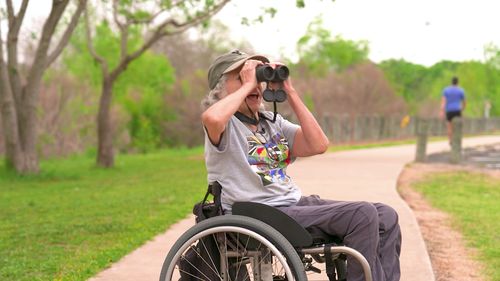This retired teacher helps birders get outside — no matter their mobility

Virginia Rose had just turned 14 when the Arabian horse she was riding took off under a guide fence wire.
“I fell off and broke my back, and I’ve been in a wheelchair ever since,” Rose told CNN.
The accident didn’t stop the enthusiastic teen from engaging in life. She had good friends and parents who didn’t let her feel sorry for herself.
She went to college and became an English teacher. “It was never expected that I would not continue living fully.”
Not until her forties did she realize something had been missing in her life.
Finding peace and herself in nature
Rose’s younger sister was an avid birdwatcher and suggested the hobby to her retired big sister. So binoculars in hand, Virginia headed outside her Austin, Texas home. It changed her life.
“I’d never experienced that kind of happiness before. Birding has provided me a way to be outside.”
She felt empowered using her manual wheelchair to explore parks she never knew about, getting exercise and peace of mind.
“I found my best self in nature.”
Looking skyward and into the treetops, she began identifying birds and their intricate songs from guidebooks and online apps.
“I was so satisfied spending three and four hours birding every time I went out. It really forces you to be in the present,” Rose said. “I feel like for years prior I was always looking elsewhere for that happiness in other people but not nature.”
She got involved in her local Audubon Society in Travis County, Texas. She took birding classes, joined them on outings, discovering she was the only one in a wheelchair. She’d call the team leaders the night before outings to anticipate any terrain challenges. Rose thrived, becoming a master birder by completing a rigorous course in bird identification, ecology and conservation– and leading outings herself.
An idea that soared – ‘Birdability’
Rose began thinking about mobility-challenged people who weren’t getting outside and into nature. About 30 million adults in the US — that’s one in seven — have mobility challenges serious enough to impact major life activities.
“I wanted them to have the same joy and the same empowerment that I had.”
But negotiating the outdoors can be challenging. Rose has 48 years of experience in a manual wheelchair and even she’s had obstacles birding. “Sand is impossible. Gravel is impossible. We’re talking about slopes and grades that a walking person may have no understanding of at all.”
In 2015, she began to rate local trails for Travis Audubon. “I was able to identify about 30 accessible trails and if not the entire trails, then portions that we could do.”
Rose presented her findings during a National Audubon Society convention. Some map designers in the audience approached her after her presentation.
Together they developed an interactive map where anyone can use a survey to rate their local trails, parks or birding patches. The survey gives nine access considerations, including handicapped parking and bathrooms, slopes, gates and ground cover.
Once a site is submitted, that site location is pinned to the map for all to see. The considerations have expanded to include sight and hearing-impaired concerns and even those Rose described as having “grumpy knees” who are looking for a “gentler birding experience.”
She founded the nonprofit group “Birdability” with the mission, Rose said, “to help everybody who has access limitations be able to enjoy birding.”
So far, the group has mapped out over 500 birding sites along with their accessibility scores, across the country and a few internationally.
Building a community of mobility-challenged birders
Anyone can join Birdability and even become what she calls “variability captains” to help those with access limitations. They hold meetings to stay on mission and have fun.
“We have almost 40 and the captains just go crazy talking to each other. These are people they’ve never otherwise seen. I feel like I’ve just become part of a new important community.”
On a recent outing near Austin, Rose pointed at a flock of gulls that had filled the sky with their bleating. She cried out as she counted them “10, 20, 30, 40! Look they’re swinging back around.” Her joy was palpable.
“Every single time you go birding there is something you would never have thought you would see,” said Rose. “I think it’s really important to have a mystery to look forward to every day.”